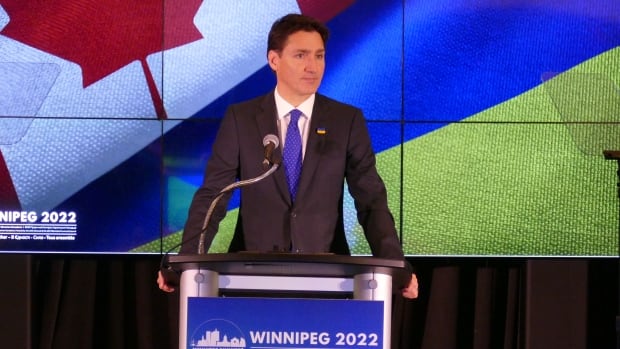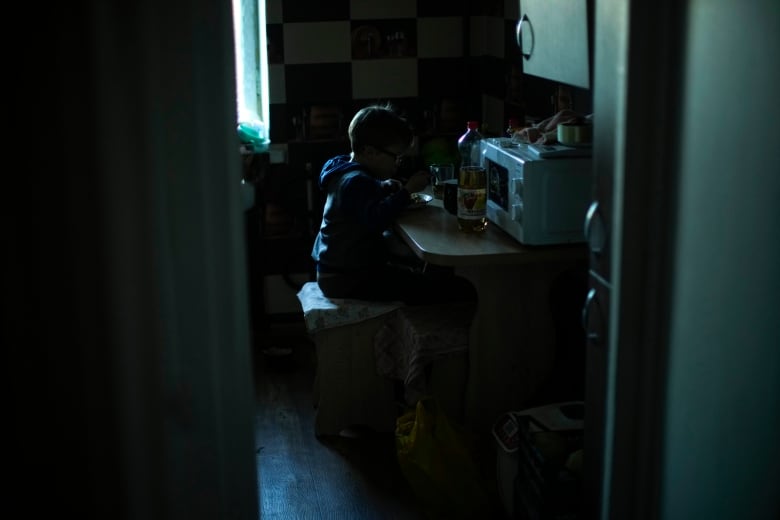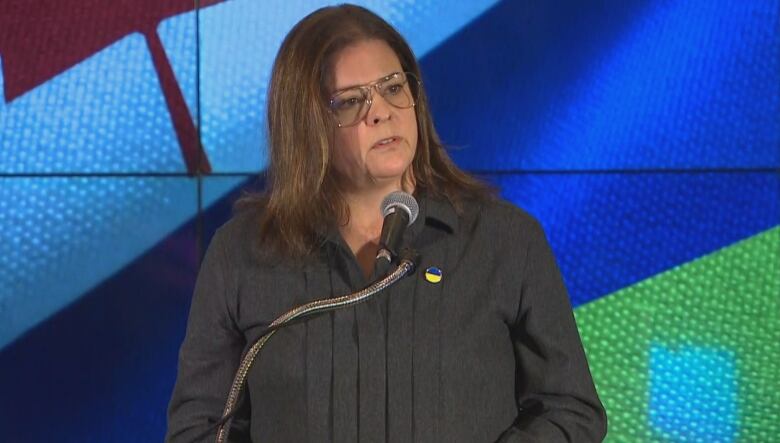
A solemn tone greeted delegates to the first nationwide gathering of Ukrainian Canadians in three years, with the last such meeting happening well before cities in Ukraine came under attack by Russian soldiers and bombs.
“It has never been more important that we come together as leaders, as Canadians and as Ukrainian Canadians,” Prime Minister Justin Trudeau said Friday morning at a Ukrainian Canadian Congress gathering in Winnipeg.
Following prayers and a moment of silence to begin the conference, Trudeau delivered the opening address to nearly 400 delegates at the 27th Triennial Congress of Ukrainian Canadians.
“Nine months ago this week, Russia launched a brutal and bloody invasion of a sovereign, democratic nation,” he said.
“They violated the post-World War II order and stability that has, for decades, upheld our peace and allowed so many people to prosper. They have murdered innocent civilians. All of you here know this better than anyone.”
Horrible images that flash on TV screens and social media feeds feature places Ukrainian Canadians know all too well, Trudeau said.
“Today, all Canadians are learning the names of these towns and cities for all the worst reasons.”
Friday marks the 247th day of the war. More than 105,000 Ukrainian nationals have fled to Canada under special immigration programs, with approximately 12,000 coming to Manitoba.
The moment the war started is as sharp as ever in the memory of Alexandra Chyczij, national president of the Ukrainian Canadian Congress.
On the evening of Feb. 23, the UCC’s board of directors had just concluded a Zoom meeting with Trudeau when everyone’s phones lit up.
“Bombs were dropping in Kyiv,” she said, then paused.
“Since then, Canada and our allies have been standing with Ukraine [and] because of that support, and the bravery and valour of the Ukrainian people … Ukraine still stands.”
More sanctions, sovereignty bonds issued
Canada is imposing sanctions on 35 more Russians, a group that includes leaders of Russian state-owned energy company Gazprom and six energy sector entities, Trudeau announced in his address.
Canada stands with Ukraine and will continue to “tighten the screws” on Russia, he said, noting more than 1,400 individuals and entities have now been sanctioned.
And there are more to come. Trudeau also announced intentions to impose sanctions on members of the Russian justice and security sectors, including police officers and investigators, prosecutors, judges and prison officials involved in “gross and systematic human rights violations against Russian opposition leaders.”
The federal government is also issuing five-year Ukraine Sovereignty Bonds, proceeds from which will be channelled directly to Ukraine through the International Monetary Fund, Trudeau said.
“There are a lot of Canadians that would like to see us do more and to be able to do more. We see it every day in the Ukrainian flags flying from car windows, painted on lampposts, or hanging on front lawns,” he said.
“We want to give all Canadians a chance to directly support Ukraine.”
It was an announcement welcomed by Chyczij, who hopes other countries do the same.
“This is a ground-breaking investment in a peaceful, democratic and just future, not only for Ukraine but for all of Europe,” she said. “The UCC calls on all states who believe in freedom and liberty to follow Canada’s example.”

A new Canada-Ukraine science partnership was also announced by the government on Friday. It will see up to 20 Ukraine-based scientists invited to work and live in Canada, to help Ukraine preserve and rebuild its science and research capacity.
“By welcoming Ukrainian scientists to Canada, we can provide meaningful and important research opportunities for individuals forced to leave behind their careers and their homes,” Natural Resources Minister Jonathan Wilkinson said in a news release.
‘We are all Ukrainians’
Manitoba Premier Heather Stefanson also addressed delegates, noting the inaugural triennial congress was held in Winnipeg in 1940 — at that time, against the backdrop of the Second World War.
“In the current brutal war of aggression against Ukraine, Manitoba is there again for the Ukrainian-Canadian community,” she said, calling the current war “a deadly, dark European stain of tragedy and suffering and devastation, and above all, of unimaginable loss.”
But one of the effects of the war has been to unite Canadians in outrage and common purpose, she said.
“While one in seven Manitobans are of Ukrainian descent, we are all Ukrainians during this terrible, terrible time.”

Canadian Defence Minister Anita Anand, who was also at the congress’s opening on Friday, spoke earlier in the morning with CBC Manitoba Information Radio guest host Faith Fundal. She said she had a message she hopes is clear to Ukraine and all of its supporters.
“We believe in your sovereignty and your security and your stability and we will do whatever we can as a country and as a NATO ally, together with other allies, to support you with military aid as well as humanitarian and economic aid to ensure that your sovereignty is protected,” she said.
“The attack on Ukraine is an attack on freedom and democracy writ large, and Canada will always stand up for those values.”
Canada has sent more than $600 million in military aid and equipment to Ukraine, including tech like cameras for drones and armoured vehicles to transport personnel to and from the front lines.
Canada is also leading training missions in the United Kingdom and Poland and preparing to send 500,000 pieces of winter clothing “to make sure that [the] Ukrainian armed forces have the winter clothing they need to fight and win this war through the winter,” Anand said.
Other essential items such as blankets, heating appliances and fuel are also being sent, while Canada will continue to supply Ukraine with lethal weapons, such as howitzers and antitank artillery.
“We are standing shoulder to shoulder with Ukraine in the short and the long term,” Anand said.
“If Ukraine were to stop fighting, it would not survive, because Russia is clearly taking every opportunity to remove its territorial integrity. In other words, Ukraine is fighting for its life.”
The congress, which gathers every three years to elect a new leadership and plan policy, is meeting through the weekend in Winnipeg.
The UCC “represents the Ukrainian Canadian community before the people and Government of Canada, promotes linkages with Ukraine and identifies and addresses the needs of the Ukrainian community in Canada,” its mission statement says.